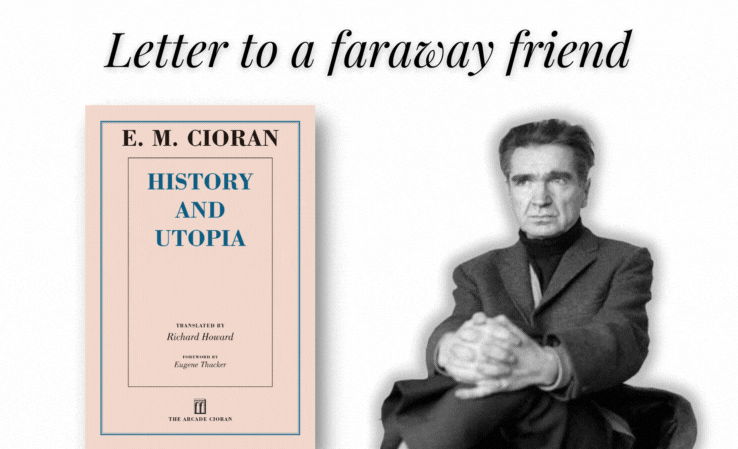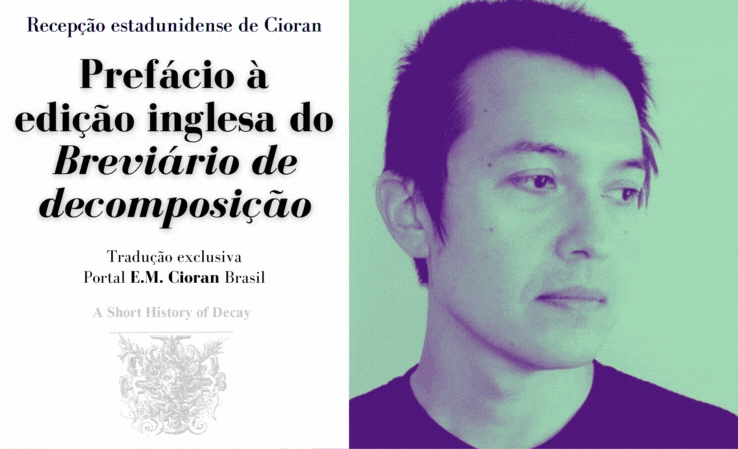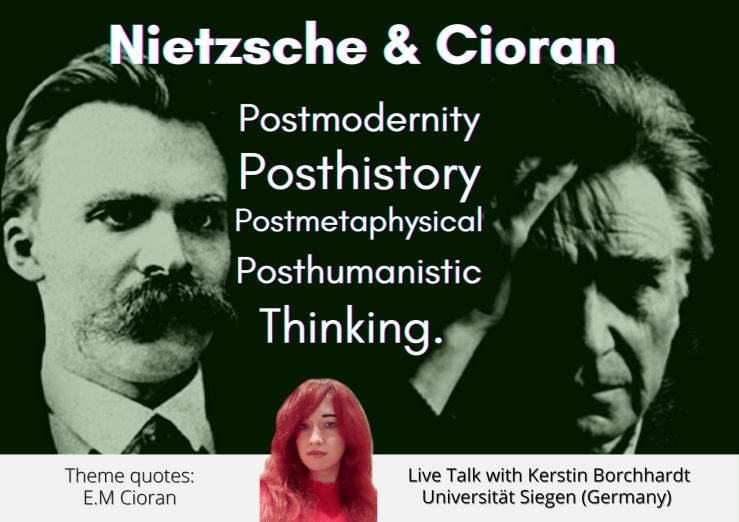We spend the prime of our sleepless nights in mentally mangling our enemies, rending their entrails, wringing their veins, trampling each organ to mush and charitably leaving them the skeleton to enjoy. Whereupon we forbear, overcome by fatigue, and drop off to sleep. A well-earned rest after so much scruple, so much zeal. Moreover we must recover our strength in order to begin all over again the next night-resuming a labor which would discourage the most Herculean butcher. No doubt about it: having enemies is no sinecure.
The program of our nights would be less crowded if by day we could give our resentment free rein. To achieve not even happiness, merely equilibrium, we need to liquidate a good number of our kind, to inflict a regular hecatomb in the fashion of our remote and relaxed ancestors. Not so relaxed, it will be objected-the cave man’s demo graphic poverty denying him any continuous opportunity for slaughter. So be it! But he had compensations, he was better provided for than we are: rushing off to hunt at all hours, falling upon wild beasts, it was still his own species he was destroying. Blood-baptized, he could readily indulge his frenzy; no need for him to disguise and defer his sanguinary intentions, whereas we are doomed to review and repress our lust for rapine till it shrivels within us reduced to curbing, to postponing, even to renouncing our revenge.
To forswear vengeance is to chain oneself to forgiveness, to founder in pardon, to be tainted by the hatred smothered within…. Spared, our enemy obsesses and aggrieves us, especially when we have resolved to abhor him no longer. Indeed we truly forgive him only if we have promoted or witnessed his fall, if he affords us the spectacle of an ignominious end or — supreme reconciliation! — if we contemplate his corpse. Such happiness, in truth, is rare and not to be relied on. For our enemy is never felled: always erect, always triumphant, it is his nature to loom up before us, flouting our timid gibes by his full-blown scorn.
Nothing is more deleterious to happiness than the “duty” to resist our primal depths, to turn a deaf ear to the call of the wild. The result? Those torments of a civilized man reduced to smiling, harnessed to calumny, and disconsolate at having to kill without making a move-by the mere power of the Word, that invisible dagger. Various are the ways of cruelty. Supplanting the jungle, conversation permits our bestiality to function without immediate damage to our kind. If, by the whim of some malefic power, we should lose the use of speech, no one would survive unscathed. The need to kill, inscribed in every cell, we have managed to transfer to our thoughts: only this feat accounts for the possibility, and the permanence, of society. May we conclude that we have won out over our native corruption, our homicidal talents? That would be to miscalculate the Word’s capacities and to exaggerate its powers. The cruelty which we have inherited, which we wield, is not to be so readily ruled; as long as we do not capitulate to it altogether, as long as we have not used it up, we preserve it in our secret self-we are never re leased from it. Your real murderer premeditates his deed, plans it out, performs it and by doing so frees himself, for a time, from his impulses; on the other hand, the man who does not kill because he cannot, though he endures the craving to do so-the unrealized assassin, let us say, the elegiac trifler of carnage-mentally commits countless crimes, and suffers far worse for them, since he drags with him the regret for all the abominations he cannot perpetrate. In the same way, the man who shrinks from revenge poisons his days, curses both his scruples and that act against nature, pardon. Doubtless revenge is not always sweet: once it is consummated, we feel inferior to our victim, or else we are tangled in the subtleties of remorse; so vengeance too has its venom, though it comes closer to what we are, to what we feel, to the very law of the self; it is also healthier than magnanimity. The Furies were held to antedate the gods, Zeus included. Vengeance before Divinity! This is the major intuition of ancient mythology.
Those who, whether from impotence, lack of opportunity, or grandstand generosity, have not reacted to their enemies’ wiles, bear upon their faces the stigmata of repressed rage, the traces of affront and opprobrium, the dishonor of having forgiven. The blows they have not dealt are turned against themselves and collaborate, within their features, to illustrate their cowardice. Bewildered and obsessed, cornered by shame, saturated with bitterness, refractory to others as to themselves, as stifled as they are ready to explode, they seem to be making a superhuman effort to ward off a risk of convulsion. The greater their impatience, the more they must disguise it, and when they cannot, they give way at last, but to no purpose, stupidly, for it is in absurdity that they founder, like those who, having accumulated too much bile and too much silence, at the crucial moment lose all their powers before their enemies, of whom they show them selves to be unworthy. Their failure will further enhance their spite, and each experience, however trifling, will signify for them a further dose of gall.
We become good-natured, we become good only by destroying the best of our nature, only by submitting our body to the discipline of anemia and our mind to that of oblivion. As long as we preserve even a trace of memory, forgiveness comes down to a struggle with our instincts, an aggression against our own ego. It is our flagrancies that keep us in tune with ourselves, insure our continuity, link us to our past, stimulate our powers of evocation; in the same way, our imaginations function only in hope of others’ misfortune, in the raptures of dis gust, in that disposition which impels us if not to commit infamies, at least to contemplate them. How could it be otherwise on a planet where flesh propagates with the shamelessness of a scourge? Wherever we go, we come up against the human, a repulsive ubiquity before which we fall into stupor and revolt, a perplexity on fire. Once, when space was less crowded, less infested by mankind, certain sects, indubitably inspired by a beneficent power, advocated and practiced castration; by an infernal paradox, they have been suppressed just when their doctrine would have been more opportune and more salutary than ever before. Maniacs of procreation, bipeds with devalued faces, we have lost all appeal for each other. And it is only on a hall-deserted earth, peopled at most by a few thousand inhabitants, that our physiognomies might re cover their ancient glamour. The multiplication of our kind borders on the obscene; the duty to love them, on the preposterous. Which does not keep our thoughts from being contaminated by the presence of the human, from stinking of the human, and from being unable to cleanse themselves of it. Of what truths are we capable, to what revelation can we rise, when this pestilence asphyxiates the mind and disqualifies it from considering anything but the pernicious and fetid animal whose emanations it endures? He who is too weak to declare war on mankind must never forget, in his moments of fervor, to pray for a second Flood, more radical than the first.
E. M. CIORAN. “Odyssey of Rancor”, in History and Utopia. Transl. by Richard Howard. New York: Arcade Publishing, 2015.
RELATED CONTENT:




















